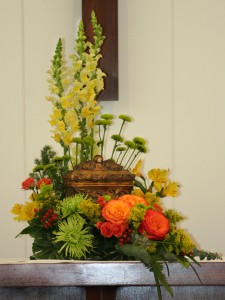When it comes to expressing your sympathy to someone who has recently lost a loved one, you want to be sincere and, most importantly, let the individual know you care. The expression of condolences becomes tricky in a country famous for its cultural and religious diversity. Don’t let yourself become flustered when all it takes is a little familiarity with funeral etiquette to overcome such unneeded stress. To help you out, FSN Funeral Homes has composed this guide to maneuvering funeral gift etiquette, giving you one less thing to worry about.
Your Relationship with the Deceased
Your relationship with the deceased is a crucial aspect to consider when determining what to send to a funeral. If you were not close to the deceased, it is appropriate to send the gift directly to the friend or family member you are closest to. If you were close to the deceased but not to the family, include a card with whatever you send explaining your relationship to the deceased and explaining how important they were to you. Whether or not they recognize you, they will appreciate knowing that someone else cared for their loved one.
When do You Send Your Condolences?
Depending on the placement and type of funeral service, it may be difficult to determine when to send a gift. Typically, flower arrangements should be sent prior to the visitation for a traditional funeral service, but funeral directors should accept them for some time later than that. Contact the funeral director to find out when would be the best time to send funeral flowers. If you find out about the services late, it is appropriate to send flowers to the grave or family’s home. If you wish to send something upon receiving the news, flowers are a good option, but a note or phone call may be more appropriate until closer to the funeral services. After some time passes, many will have moved on in their mourning, but those closest to the deceased may still be grieving. Sending a sunny bouquet of flowers after the funeral will let them know they are not forgotten in their grief.
The Recipient
Everyone is unique so the gift for a deceased’s mother will not be the same for a child affected by the death. Keep this in mind when deciding what to send. A young child will not understand the thought behind traditional flowers, but if you add a stuffed animal to cheer them up or a keepsake which they can appreciate later, the gift will be more appropriate. You can also tailor any flower arrangements you send to fit the personality of the recipient. Work with your local florist to make sure he or she incorporates the recipient’s favorite flowers or colors and that the size of the arrangement is appropriate for its destination. Also, depending on the recipient’s intimacy with the deceased, a more personal gift may be more appropriate. For instance, a locket with the deceased’s picture or a simple memorial frame may be the perfect keepsake to console the individual.
The Deceased
The deceased should also be considered when deciding what to send to a funeral. If the deceased would have preferred donations made to his or her favorite charity, then by all means follow their wishes. At the same time, remember the deceased would also appreciate that their loved ones be comforted at this time, so flowers or a memorial gift would be a great way to extend this sentiment in the deceased’s honor.
Type of Funeral and Appropriate Condolences
Military
Flowers, donations, and other condolence gifts are all acceptable at a military funeral service. While some services, like traditional Navy funeral services, may be connected to a waterway, flowers are still acceptable. Many times the scattering of flowers into the water will be part of the ceremony. Including red, white and blue color schemes, flags or other patriotic elements in a funeral flower arrangement would be a good way to acknowledge the individual’s service.
Cremation
While it may seem difficult to incorporate flowers into a service without a casket or burial, today there are options for cremation services. Many florists create beautiful flower arrangements which will fit perfectly alongside an urn. Ask the family or funeral director if such a piece has been provided and whether it would be appreciated, then work with your local florist to make the perfect flower arrangement for the urn.
No Service
If no funeral services are being held for the deceased, it is appropriate to send gifts to the family or close friends’ homes. Just because there is no service, does not mean there is no mourning. A beautiful bouquet or gift basket could be the perfect pick-me-up to remind those grieving that you are thinking of them.
Religious Condolence Customs
Jewish
In a traditional Jewish home, mourning is taken very seriously. Those in mourning or “sitting Shivah” have very specific rules they must follow to properly honor their deceased loved one. During this time, many Jews are forbidden to receive gifts of any kind. Flowers and other condolences are considered signs of joy at a time when grief should be the priority. A good alternative to memorials or flowers would be to visit the family at their home and bring along a food platter or dish. They will be receiving many guests and have little time to prepare food for anyone. Don’t forget to make sure it’s kosher! Also, check with the funeral director and see if the family is accepting flower arrangements and memorials for the funeral itself; these are not necessarily banned from the Jewish funeral.
Hindu
Those who practice Hinduism will not be offended if flowers are brought to the funeral, but it is not customary. Traditionally different fruits will be presented to the family upon visiting them after the funeral. Fruit is also used at an altar honoring the deceased during the Hindu funeral. Think about putting together an elegant fruit basket or see what your local florist can put together.
Buddhist
Depending on the culture of the deceased’s family at a Buddhist funeral, the appropriate gift varies. Fresh flowers are often welcome because the presentation of the altar is very important. Incense and candles are also used during the funeral service to honor the deceased. Typically, food is catered to the family and close friends so it may be excessive to bring an edible gift for the funeral you attend. Ask the funeral director what the family’s wishes are if you are unsure which customs they follow. Be careful with flowers based on the deceased’s nationality. Many Asian funerals forbid the color red.
Islamic
While flowers and other decorative pieces should not be placed on the grave of a Muslim, you should ask the funeral director what the family’s wishes are at the funeral services. Donations to the deceased’s favorite charity or church are appreciated, as well as, donations given for the paying of the deceased’s debts. Both are recognized gifts in the Qur’an which are believed to serve the deceased after death and are considered signs of respect at Islamic funeral services. Food is also appreciated since it is not considered acceptable for the family who is occupied with the loss of their loved one to deal with cooking and other similar tasks.
Christian
In most Christian funeral services, flowers, memorials and other funeral gifts are completely acceptable. Monetary donations should be considered based on your relationship with the recipient and their wishes. At Catholic funerals, there are typically collections held for a special mass in honor of the deceased. Casseroles and other pre-prepared dishes are also thoughtful gifts that will ease the family’s stress. During Mormon funerals, the Mormon Relief Society – an organization of the church’s women – will typically handle any food the family needs so such gifts would be excessive.
Cultural Condolence Customs
Asian
The color red is unacceptable at Asian funerals since it symbolizes happiness, making red flowers an inappropriate gift. Muted colors, especially white, are more acceptable in Asian funeral flowers. Because expenses are high around this time and the family may be dealing with debt left by the deceased, monetary donations are greatly appreciated to ease the family’s struggle. Kodens are a popular Japanese condolence. Money placed in a special envelope, a koden, is a sign of respect and is meant to help the family during this time cover funeral expenses. The special envelope may be found online or you could check your local post office.
Hispanic
Flowers are very appropriate for Hispanic funerals. Candles are also a good idea since they are used as part of the ceremony. Try personalizing the candle or ordering a unique one to make the gift special.
Once you have considered these elements, keep in mind that everyone practices their faith differently and that people celebrate their culture to many different degrees. If you are unsure to what extent the deceased’s family follows tradition, simply ask. If you are not comfortable questioning the family about their practices, go to the funeral director. The funeral director will have a good understanding of the family’s wishes and can politely request the information if he or she doesn’t know.
Funeral Urn Flowers photograph courtesy of Blumz…by JR Designs
Taps photograph from Virginia Guard Public Affairs on Flickr.
Buddhist Offering photograph from acdme on Flickr.
Koden photograph from chriki24 on Flickr.
Tags: Funeral Etiquette, Funeral Flowers, Funeral Traditions



